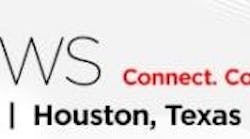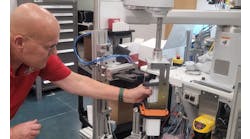Paula Gold-Williams, CEO of CPS Energy Co. in San Antonio, Texas, started as an accountant when she joined the utility power industry about 30 years ago. Over the years, she served in almost every supervisory, managing and leadership role on her way to the C-suite.
“Back then accounting was as fraternal as it could be," said Gold-Williams, who is also African American. "I've told my daughters how it was, and they're just aghast. The industry has changed a lot since then, but not enough."
Gold-Williams kicked off the Women in Industry: Empowering Women to Leadership program this week at ABB Customer World with the keynote address, "Past, present and future.” The program was sponsored by ABB and energy conference organizer EUCI.
Gold-Williams acknowledged that gradual evolution has enabled more opportunities for women in energy and other industries, but she stressed that women must also be willing to make a habit of seizing them. "Thanks to ABB and EUCI for launching this awesome partnership, which looks like it will get bigger each year," she said. "This event is a good chance to network, but we must also know how to make changes every day, and the way to do it is by not boxing ourselves in."
Powerful profile
CPS Energy Co. is a 157-year-old, municipally owned utility in San Antonio, Tex., which started out producing natural gas, and then added electricity production originally based on coal, nuclear, and more recently on hydropower, wind and solar. It serves eight counties, and its present profile includes 41% natural gas, 27% coal, 13% nuclear, 12% wind and landfill gas, and 2% solar. The utility has $2.6 billion in revenue and $11 billion in assets.
"A lot of energy companies in Texas must pick a lane—generation, transmission or customer-facing—if they're not municipally owned," explained Gold-Williams. "In our case, because we've been owned by the city of San Antonio since 1942, and must answer to the city council and mayor, we have a fully integrated and diverse energy portfolio, including gas, coal, an investment in nuclear, 1,000 megawatts (MW) of wind, and 500 MW of solar, including a 14-MW photovoltaic facility. In the next 20 years, we are expecting that mix to change."
Gold-Williams added that CPS Energy is also seeing a technological shift towards everything from smarter components to smart phones. "Utilities have been slow to adopt many of these more intelligent devices and software, but I believe we'll speed up soon," she said.
Best career practices
Based on her decades of experience, Gold-Williams' primary advice to younger colleagues, women and students is to say yes to almost every opportunity, and then to ask more questions. "You also have to expect that you may not always get a lot of answers," she explained. “And the fewer answers they have for you, the more it allows you to design your own success."
[sidebar id =1]
Gold-Williams has read Sheryl Sandberg's book Lean In, and knows professional women who think they must always know what's going on and what is the plan. “But there's a limit to that," she added. "You also have to allow yourself to be less than a perfect fit, and let yourself be free to be creative. Thinking that all the details have to be perfect matters less as you move up in leadership. At those levels, there are fewer details, and it's more about using an organization's power, moving from point A to point B, and solving problems and issues."
After forming a women's network support group at CPS Energy, Gold-Williams added that she and her colleagues invited their senior leaders to sit in. "You have to network because that's how you find the ways to power," she explained. "You can do that investigation yourself, find the right executives, attach yourself, and learn from them."
Service sparks leadership
To handle these technical transitions and keep providing power to San Antonio's residents, Gold-Williams reported that CPS Energy focuses on addressing issues and interacting with the city's resident and communities more than ever—and this inevitably leads to improved leadership.
"I'm an accountant, but I love engineers because they solve problems." said Gold Williams. "I believe the CEO of an organization is on the bottom of an inverted pyramid, and supports the other leaders, executives, managers, employees, customers and communities above. We don't want them to have to worry."
Gold-Williams added that CPS Energy recently updated its website with more customer-focused services. "We know we're behind on technology, and we're trying to catch up, but in many ways, we're even further behind in the way we think," she explained. "For example, we previously supplied power just up to the meter, and didn't worry about what happened in the homes. Now that meters are smarter, we're beginning to gather volume data, and learning to add value both in front and behind the meter. All kinds of new technologies are being added in homes, and we need to be on that solution set."
Gold-Williams added that solar is enabling customers to send power back to the grid, but this is often causing more electrical frequency and power-quality issue that CPS Energy must address with help from newer optimization technologies. She reported that the utility is already 68% done with its present grid-modernization project that includes smarter street lights and other components.
"We want to be a partner, not just a provider," added Gold-Williams. "But to make it happen, we must have good people who can add value. This means the leaders must know the focus and anchor of each individual."
She reported these attributes were especially helpful when CPS Energy helped its customers and communities recover from storms and tornadoes in February that turned one of its transmission towers into a horseshoe, destroyed 100 homes, and cut power to 85,000 residents. "We cooperated with local government, connected with customers on social media, stayed on the phones 24/7, and thanked everyone when it was over," said Gold-Williams. "I know that I run an analytical engineering firm, but sometimes we have to manage emergency recoveries, too.”
"As a result, I don't really focus on the fact that I'm a woman or an African-American. All of that's true, but so what? That's why I talk more about being an accountant and solving problems. You have to be careful not to create doubt when there is none. I've learned that I don't have to be extra gregarious or worry that I'm 'acting like a man.' You just have to be yourself, say yes, and jump in and solve problems. You also can't be afraid to fail, because you'll learn a lot more from failures than you ever will from success.”






